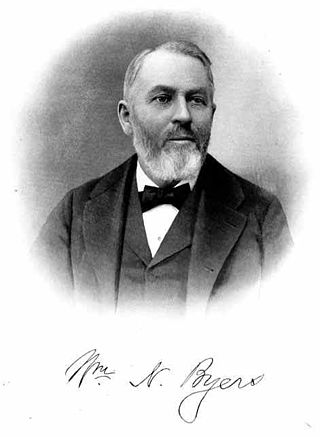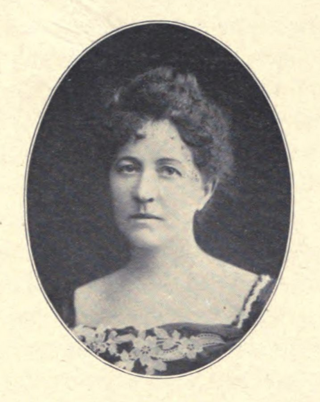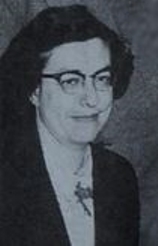Related Research Articles

Horace Austin Warner "Haw" Tabor, also known as The Bonanza King of Leadville and The Silver King, was an American prospector, businessman, and Republican politician. His success in Leadville, Colorado's silver mines made him one of the wealthiest men in Colorado. He purchased more mining enterprises throughout Colorado and the Southwestern United States, and he was a philanthropist. After the collapse in the silver market during the Panic of 1893, Tabor was financially devastated. He lost most of his holdings, and he labored in the mines. In his last year, he was the postmaster of Denver.

William Newton Byers was a founding figure of Omaha, Nebraska, serving as the first deputy surveyor of the Nebraska Territory, on the first Omaha City Council, and as a member of the first Nebraska Territorial Legislature.
Wendy Lucero-Schayes is a retired female diver from the United States, who competed for her native country at the 1988 Summer Olympics.

Clara Brown (1800–1885) was a former enslaved woman from Virginia and Kentucky who became a community leader and philanthropist. She helped formerly enslaved people become settled during Colorado's Gold Rush. She was known as the 'Angel of the Rockies' and made her mark as "Colorado's first black settler and a prosperous entrepreneur".

Elizabeth Robbins Stone was an American pioneer woman who was inducted into the Colorado Women's Hall of Fame in 1988.

Ellis Meredith (1865–1955) was an American suffragist, journalist, and novelist, known as the Susan B. Anthony of Colorado.

Emma Homan Thayer (1842–1908) was a 19th-century American botanical artist and author of books about native wildflowers. She also wrote several novels.

Elizabeth Piper Ensley, was an educator and an African-American suffragist. Born in Massachusetts, Ensley was a teacher on the eastern coast of the country. She moved to Colorado where she achieved prominence as a leader in the Colorado suffrage movement. She was also a journalist, activist, and a leader and founder of local women's clubs.

Mary Madeline "May" Bonfils Stanton was an American heiress and philanthropist. She and her younger sister, Helen Bonfils, succeeded their father, Frederick Gilmer Bonfils, as principal owners of The Denver Post. However, May's elopement at age 21 with a non-Catholic salesman had forged a rift in her relationship with her parents and sister that worsened when Helen inherited the majority of their parents' estates. Following a three-year legal battle over the inheritance, the sisters cut off all communication with each other. May married twice but did not have children. Living a reclusive life, she invested her fortune into building and furnishing her 750-acre (300 ha) estate in Lakewood, Colorado – which included a mansion that was an exact replica of Marie Antoinette's Petit Trianon château in Versailles – and into many philanthropic endeavors in the state of Colorado. The Bonfils–Stanton Foundation, established by her second husband after her death in 1962, continues to support the arts in Colorado. She was posthumously inducted into the Colorado Women's Hall of Fame in 1985.

Helen Peterson was a Cheyenne-Lakota activist and lobbyist. She was the first director of the Denver Commission on Human Relations. She was the second Native American woman to become director of the National Congress of American Indians at a time when the government wanted to discharge their treaty obligations to the tribes by eliminating their tribal governments through the Indian termination policy and forcing the tribe members to assimilate into the mainstream culture. She authored a resolution on Native American education, which was ratified at the second Inter-American Indian Conference, held in Cuzco, Peru. In 1986, Peterson was inducted into the Colorado Women's Hall of Fame and the following year, her papers were donated to the Smithsonian's National Anthropological Archives and they are now held at the National Museum of the American Indian.
Carlota D.d.R EspinoZa is an American painter, muralist, and activist in her Art. She is one of the early Latina / Chicana muralists in Denver with works in Cuba, San Francisco, Texas, Arizona, and Colorado.

Mexican-American folklore refers to the tales and history of Chicano people who live in the United States.

Kali Fajardo-Anstine is an American novelist and short story writer from Denver, Colorado. She won the 2020 American Book Award for Sabrina & Corina: Stories and was a 2019 finalist for the National Book Award for Fiction. Her first novel, Woman of Light: A Novel (2022), is a national bestseller and won the 2023 WILLA Literary Award in Historical Fiction. She is the 2022–2024 Endowed Chair in Creative Writing at Texas State University and a 2023 Guggenheim Fellow.
Charlene Garcia Simms is a teacher-librarian from Garcia, Colorado. She and her husband founded El Escritorio Publishing which focuses on Southwest history and genealogy.
Shirley Romero Otero is a Chicana activist who co-founded the Land Rights Council in 1977 to regain the rights for heirs of the Sangre de Cristo Land Grant. She is an educator and leader in the San Luis Valley region. She is the director of the Move Mountains Youth Project and sits on the board of directors of the Acequia Institute.
Deborah Martinez-Martinez is CEO of the publisher Vanishing Horizons and is an author who explores the history of the Southwestern United States. She worked in higher education admissions and recruitment for twenty years and advocates for more Chicanas in education.
Lucy Lucero was a Latina community leader in Denver, Colorado. Her home on Galapago St. was known as a haven for the Hispanic and Latino community, especially for young gay latinos who were ostracized from their own families. She was the great-aunt of author Kali Fajardo-Anstine.
Arlette Lucero is an American visual artist, educator, and illustrator.
The Corn Mothers and Return of the Corn Mothers: Inspiring Women of the Southwest exhibits are traveling exhibits honoring women in the southwestern U.S.
Jeanette Trujillo-Lucero is a dancer who has been recognized for her Spanish and folklore dances. She is the founder and artistic director of Fiesta Colorado Dance Company and Ballet Folklorico de Colorado. Her stage name is "La Muñeca" for her petite stature. Her dance background includes Mexican folklorico, classical Spanish dance, Flamenco, jazz, tap, and ballet.
References
- 1 2 3 4 5 6 7 8 9 10 11 12 Gonzalez, Erika (December 11, 2004). "THE SPICE OF LIFE - HARSH EARLY EXPERIENCES INSPIRED PROMOTER TO SHARE CULTURE". Rocky Mountain News.
- 1 2 3 4 "Dr. Elizabeth Fajardo". Metropolitan State University.
- 1 2 Mathurin, Desiree. ""Return of the Corn Mothers" exhibit celebrates women making a difference in their communities". Denverite.
- 1 2 3 "Renee Fajardo". Colorado Alliance of Latino Mentors and Authors.
- ↑ Taufen, Amber. "Corntastic". Westword.
- 1 2 Monaghan, Shane. "Inside Denver Author Kali Fajardo-Anstine's Much Anticipated Debut Novel". 5280 Magazine.
- ↑ "Dr. Elizabeth Renee Fajardo -- MSU Denver MLK Peace Award Recipient 2017".